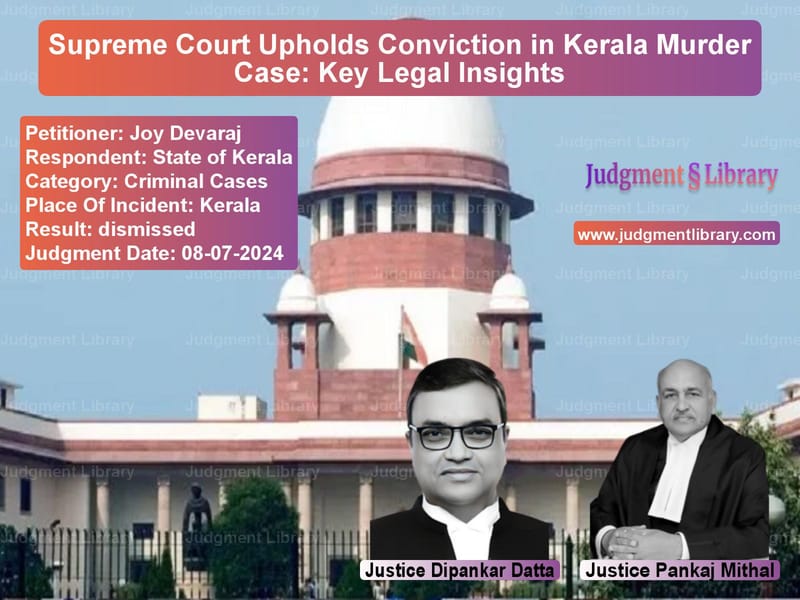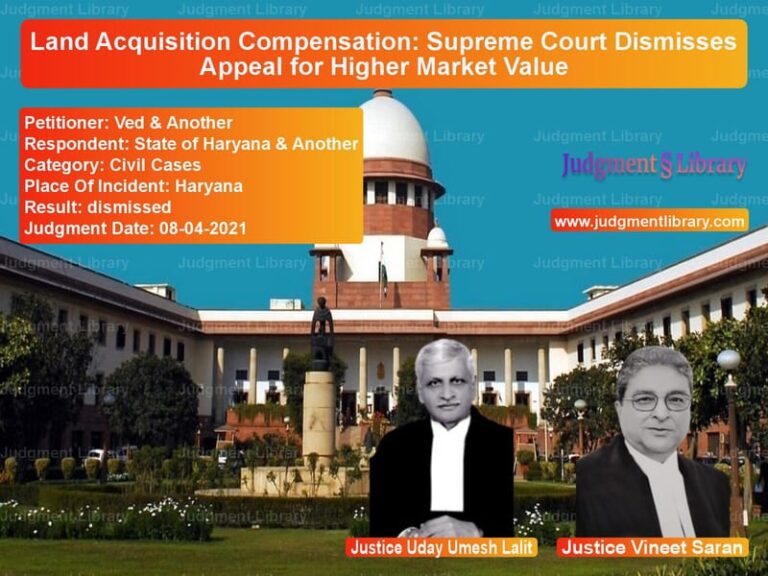Supreme Court Upholds Conviction in Kerala Murder Case: Key Legal Insights
The case of Joy Devaraj vs. State of Kerala was a critical test of criminal jurisprudence, centering around a brutal murder that took place in Kerala. The Supreme Court upheld the conviction of the appellant, who was found guilty under Sections 143, 147, 148, and 302 of the Indian Penal Code (IPC), rejecting the plea for acquittal. This ruling reaffirmed the importance of eyewitness testimony, forensic evidence, and the application of legal principles to determine criminal intent.
Background of the Case
The incident dates back to December 26, 1999, when a dispute between two individuals escalated into an organized attack. The deceased, Bobby, was an active member of an anti-liquor movement, attempting to curb illicit liquor sales. On December 24, 1999, Bobby had an altercation with one of the accused, identified as A4, who was allegedly involved in illicit liquor trade. Two days later, a group of 15 men, including the appellant, ambushed Bobby while he was standing near his house, talking to acquaintances.
According to the prosecution, the appellant, armed with a dagger, dragged Bobby to the ground and stabbed him in the chest. The other accused joined in, assaulting Bobby with hockey sticks before hurling an explosive device at a nearby house as they fled. Despite being rushed to the hospital, Bobby succumbed to his injuries. The case was registered at the Kannur City Police Station, and the investigation led to the trial of the 15 accused.
Read also: https://judgmentlibrary.com/supreme-court-cancels-bail-in-uapa-case-against-pfi-members/
Petitioner’s Arguments
The appellant challenged his conviction on the following grounds:
- The testimonies of eyewitnesses contained inconsistencies, making them unreliable.
- The prosecution failed to prove beyond reasonable doubt that the appellant was responsible for the fatal attack.
- One of the key eyewitnesses, PW4, turned hostile during the trial, raising doubts about the sequence of events.
- Even if the appellant was involved in the altercation, the prosecution failed to establish that he had the intent to kill, a necessary element under Section 302 IPC.
Respondent’s Arguments
The prosecution and the State of Kerala countered these arguments, stating:
- The appellant was identified by multiple eyewitnesses as the individual who inflicted the fatal stab wound.
- Minor inconsistencies in witness statements were insufficient to undermine the overall reliability of their testimony.
- The medical evidence corroborated the prosecution’s case, confirming that the nature of the stab wound was sufficient to cause death.
- The appellant’s act was premeditated, given the use of a deadly weapon, the selection of a vital organ, and the organized nature of the attack.
Supreme Court’s Observations
The Supreme Court examined the reliability of the witnesses, forensic evidence, and legal principles governing murder convictions. The Court made the following key observations:
“Discrepancies in eyewitness testimony are natural, especially in chaotic circumstances. The credibility of a witness is not eroded by minor inconsistencies, but by contradictions that go to the root of the prosecution’s case.”
The Court noted that while PW4 turned hostile, the testimonies of PW1 and PW2 remained consistent regarding the appellant’s direct involvement in the crime. The Court also referred to past precedents, emphasizing that conviction can be sustained based on a single trustworthy witness.
Read also: https://judgmentlibrary.com/supreme-court-cancels-bail-in-double-murder-case-a-legal-review/
Legal Analysis: Culpable Homicide vs. Murder
The appellant argued that his actions did not constitute murder under Section 300 IPC, as there was no clear intention to cause death. The Supreme Court, however, rejected this argument, applying the factors established in Pulicherla Nagaraju vs. State of Andhra Pradesh:
- The appellant used a dagger, a deadly weapon, to inflict the fatal injury.
- The stab wound was directed at the chest, a vital organ.
- There was no provocation from the victim, indicating premeditation.
- The medical report confirmed that the injury was sufficient to cause death in the ordinary course of nature.
Based on these findings, the Court held that the appellant’s actions fell squarely within the definition of murder under Section 300 IPC.
Final Verdict
The Supreme Court upheld the conviction, ruling:
“The prosecution has established beyond reasonable doubt that the appellant intentionally caused the victim’s death. The appeal is dismissed, and the conviction and sentence stand affirmed.”
Additionally, the Court ordered the appellant to surrender and serve the remainder of his sentence, vacating his bail order.
Conclusion
This judgment underscores the significance of consistent eyewitness testimony, forensic evidence, and legal principles in determining criminal intent. It reaffirms that premeditated attacks resulting in fatal injuries will be treated as murder under the law, ensuring justice for victims and their families.
Petitioner Name: Joy Devaraj.Respondent Name: State of Kerala.Judgment By: Justice Dipankar Datta, Justice Pankaj Mithal.Place Of Incident: Kerala.Judgment Date: 08-07-2024.
Don’t miss out on the full details! Download the complete judgment in PDF format below and gain valuable insights instantly!
Download Judgment: joy-devaraj-vs-state-of-kerala-supreme-court-of-india-judgment-dated-08-07-2024.pdf
Directly Download Judgment: Directly download this Judgment
See all petitions in Murder Cases
See all petitions in Bail and Anticipatory Bail
See all petitions in Attempt to Murder Cases
See all petitions in Fraud and Forgery
See all petitions in Custodial Deaths and Police Misconduct
See all petitions in Judgment by Dipankar Datta
See all petitions in Judgment by Pankaj Mithal
See all petitions in dismissed
See all petitions in supreme court of India judgments July 2024
See all petitions in 2024 judgments
See all posts in Criminal Cases Category
See all allowed petitions in Criminal Cases Category
See all Dismissed petitions in Criminal Cases Category
See all partially allowed petitions in Criminal Cases Category







